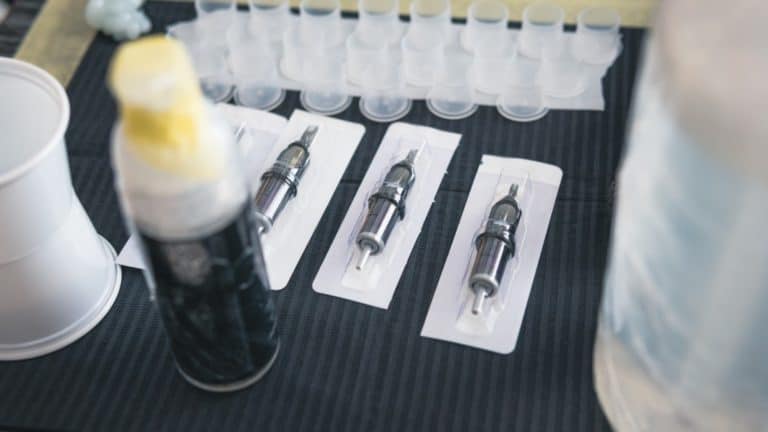Tattoos have become far less taboo in recent history. They were once considered to be a sign of criminal activity, or unprofessional. These days nearly one in six people have or will get a tattoo in their lives. This means if you want a tattoo, you should get one.
Even if you are one of the million plus people who have a blood borne disease like HIV or Herpes. This article will discuss some of the basics of getting inked when you have HIV or Herpes.
Don’t be Fooled by Stigma
Do not let the stigma against these diseases scare you into not getting the tattoo you want. There is zero chance of the artist becoming infected with the disease. Simple knowledge of HIV and Herpes will tell you that these diseases begin to die as soon as they come into contact with air outside the body.
The only way for there to be even a chance of infection is if the tattoo shop does not use new ink pods with each tattoo, does not properly disinfect equipment, or if they reuse needles.
All of these 
It is actually illegal in many countries, including Ireland, and the United States to refuse service of any kind on the basis of a blood borne disease like HIV or Herpes.
Don’t get stressed if you are denied a tattoo on this basis. There is bound to be another shop that will be happy to tattoo you. It might even be just around the corner.
If you a shop does deny you services for having HIV or Herpes, you can report them for a violation of the American with Disabilities Act (ADA). To file a complete, you can file out a form online at this site: ada.gov.
Get Inked at a Licensed Shop
As a general rule of thumb, you should stay clear from unlicensed tattoo parlors. A licensed tattoo parlor will display their license(s) up front and center in the front of their shop. If you do not see these licenses in the lobby, you can ask one of the shop employees to show you them. Or, you may just want to leave instead. A reputable tattoo shop will definitely have them on display in their lobby.
In addition, you can be much more confident a licensed shop is taking the proper steps to ensure everything is clean and sterilized.
Trust Your Artist
You are not required to disclose your diagnosis with your tattoo artist. Though, it is strongly suggested that you do so. Getting a tattoo means that you are getting ink permanently injected into your skin. It will be on your body forever.
The tattooing process requires a lot of trust between the artist and the client. So, it is best to be completely open and honest with your artist to make sure the experience is a positive one.
The artist will want you to be happy with the tattoo, just like you want to be completely content with what is permanently on your body. Your artist also needs to trust you to ensure that they give you the best possible tattoo experience. They want you to be happy with the design, and with the final product.
They need to make sure that what they design and ultimately tattoo on you, is exactly what you want. They need to make sure you let them know when you have had enough for the day, or need a break in the session. So, consider being open and honest with your tattoo artist about your HIV or Herpes disease.
Tattoo Artists Specialize in the Atypical
Another reason you will want to be honest with your tattoo artist about your HIV or Herpes diagnosis is that many tattoo artists have specific training on how to best tattoo those with blood borne diseases. The Red Cross actually offers a certification course for tattoo artists on how to properly tattoo those with HIV or Herpes.
Most of what is taught in this course is just a reiteration of the safe and sanitary tattoo practices that are required for a tattoo shop to be licensed. This includes making sure that ink pods are not 
This course makes clear how incredibly unsafe, and illegal the practices that were mentioned earlier are.
Once again, as long as a tattoo shop is following these guidelines, there is zero chance of your artist becoming infected. So, if a shop denies on such a basis, they are either misinformed, or are practicing very unsafe and unsanitary methods of tattooing.
By disclosing your HIV or Herpes diagnosis with your tattoo artist, they can make sure you are set up for success with your new tattoo. Tattoo artists who have taken the Red Cross course will have a better understanding of how your body works, and what it can handle as far as a new tattoo goes. They will also be able to advise you on the best ways to heal tattoos when you have HIV or Herpes.
The Tattoo Industry is Progressive
It is also important to note that the tattooing profession is still considered somewhat taboo. Even if having a tattoo is not considered such anymore. Those in taboo culture careers tend to be a bit progressive. For this reason, many tattoo artists specialize in giving the ultimate tattoo experience for those in atypical situations, such as having HIV or Herpes.
Many tattoo artists are certified and specialize in tattooing those with specific needs. This includes tattooing skin graphs, or having scars from previous abusive relationships. Many even specialize in tattooing children with terminal cancer. Others offer free cover up tattoos from poor decisions made by people when they were younger, and who have since grown out of that way of thinking. Many tattoo artists cover up tattoos of offensive or racist symbols for free.
The tattooing profession is still quite taboo and progressive. So, it is a safe bet that you will be able to find the right tattoo artist to serve your own atypical condition of HIV or Herpes.
Make Sure You Are Healthy
It is important that you make sure that you are healthy and that your CD4 count is checked before you get a tattoo with HIV or Herpes. Tattoos can occasionally become infected, and being ill at the time of getting inked can increase the chance of your tattoo becoming infected.
Most people who live with HIV or Herpes are used to the patterns of their bodies and their health, and most get their CD4 levels checked regularly. You will likely know better than anyone else if you are healthy enough to get a tattoo.
However, it is strongly advised that you consult your doctor before getting a new tattoo. It is best to wait at least 4 – 6 weeks after you have officially received from being ill to get a tattoo.
Takeaway
So there you have it. The basics of getting inked with a blood borne illness such as HIV or Herpes. The takeaways from this article should be –
- There is zero chance of your tattoo artist or anyone in the shop becoming infected, so long as they are deploying safe and sanitary practices.
- Any licensed shop will be following these guidelines. Make sure you get inked by a licensed tattoo shop.
- It is illegal for a tattoo shop to refuse to tattoo you based on your diagnosis. If this happens, you may report the shop. You are bound to find a shop that will be happy to tattoo you.
- Be as open and honest with your tattoo artist as you feel comfortable. You should not be afraid to disclose your diagnosis. The tattoo artist will likely be trained on how to tattoo those with HIV and Herpes.
- Make sure you are in good health before you get inked. Check with your doctor beforehand, and make sure that your CD4 levels are healthy.

